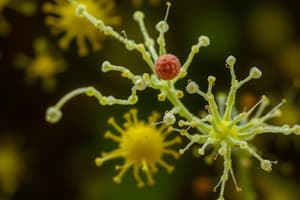Podcast
Questions and Answers
Which of the following is a role of beneficial microbes in human health?
Which of the following is a role of beneficial microbes in human health?
- Enhancing soil fertility
- Producing biopesticides for plants
- Decomposing organic matter
- Aiding in digestion and synthesizing vitamins (correct)
What is a common application of microbial biotechnology in industry?
What is a common application of microbial biotechnology in industry?
- Breaking down pollutants in soil
- Fermentation processes in pharmaceuticals (correct)
- Production of nitrogen-fixing bacteria
- Enhancing flavor in fermented foods
Which of the following statements best describes the function of microbes in agriculture?
Which of the following statements best describes the function of microbes in agriculture?
- They exclusively serve as food sources for pests.
- They are only involved in bioremediation processes.
- They solely produce antibiotics for plant protection.
- They promote growth through hormone production and enhance soil fertility. (correct)
What is a significant concern associated with antibiotic use in public health?
What is a significant concern associated with antibiotic use in public health?
Which process is primarily influenced by microbes in food production?
Which process is primarily influenced by microbes in food production?
Flashcards are hidden until you start studying
Study Notes
Beneficial Microbes
- Role in Ecosystems:
- Decompose organic matter, recycling nutrients.
- Form symbiotic relationships with plants (e.g., mycorrhizae).
- Human Health:
- Gut microbiota aids digestion and synthesizes vitamins.
- Probiotics improve gut health and boost immunity.
- Bioremediation:
- Microbes breakdown pollutants (e.g., oil spills).
Microbial Biotechnology
- Applications:
- Production of antibiotics (e.g., penicillin).
- Genetic engineering for gene therapy and vaccine development.
- Industrial Uses:
- Fermentation processes in pharmaceuticals and biofuels.
- Production of enzymes for detergents and food industries.
- Research Tools:
- Use of microbes in recombinant DNA technology.
Microbes In Agriculture
- Soil Health:
- Nitrogen-fixing bacteria enhance soil fertility.
- Decomposers improve soil structure and nutrient content.
- Biopesticides:
- Use of bacteria and fungi to control agricultural pests.
- Plant Growth Promotion:
- Certain microbes promote growth through hormone production.
Microbes In Food Production
- Fermentation:
- Key in producing yogurt, cheese, bread, and alcoholic beverages.
- Enhances flavor, texture, and preservation of foods.
- Food Safety:
- Lactobacillus and other probiotics prevent spoilage and pathogenic growth.
- Nutritional Enhancement:
- Fermented foods can increase bioavailability of nutrients.
Pathogens And Public Health
- Infectious Diseases:
- Bacteria, viruses, fungi, and protozoa cause diseases (e.g., tuberculosis, flu).
- Antibiotic Resistance:
- Overuse of antibiotics leads to resistant strains, complicating treatments.
- Preventive Measures:
- Vaccination, sanitation, and hygiene are critical in controlling pathogen spread.
- Surveillance and Response:
- Public health monitoring systems track outbreaks and implement responses.
Beneficial Microbes
- Decomposers recycle nutrients by breaking down organic matter.
- Symbiotic relationships, such as mycorrhizae, enhance plant nutrient uptake.
- Gut microbiota supports digestion and synthesizes essential vitamins.
- Probiotics are beneficial for gut health and enhance immune function.
- Microbes play a crucial role in bioremediation by breaking down environmental pollutants, like those from oil spills.
Microbial Biotechnology
- Antibiotics, including penicillin, are produced through microbial synthesis.
- Genetic engineering utilizes microbes for gene therapy and vaccine production.
- Fermentation processes are essential in producing pharmaceuticals and biofuels.
- Enzymes generated by microbes are widely used in the detergent and food industries.
- Recombinant DNA technology relies on microbes as vital research tools.
Microbes in Agriculture
- Nitrogen-fixing bacteria significantly improve soil fertility.
- Decomposers contribute to better soil structure and increased nutrient content.
- Biopesticides harness bacteria and fungi to manage agricultural pests.
- Certain microbes stimulate plant growth through hormone production.
Microbes in Food Production
- Fermentation is fundamental in making yogurt, cheese, bread, and alcoholic beverages.
- Processes enhance food flavor, texture, and preservation.
- Probiotics, such as Lactobacillus, help prevent spoilage and pathogenic contamination.
- Fermented foods improve the bioavailability of nutrients.
Pathogens and Public Health
- Infectious diseases caused by bacteria, viruses, fungi, and protozoa include tuberculosis and influenza.
- Overuse of antibiotics contributes to the emergence of resistant pathogen strains, complicating treatment.
- Vaccination, sanitation, and hygiene are critical strategies for controlling the spread of pathogens.
- Public health monitoring systems are essential for tracking outbreaks and coordinating responses.
Studying That Suits You
Use AI to generate personalized quizzes and flashcards to suit your learning preferences.




